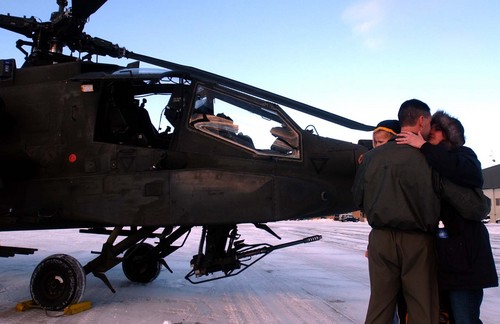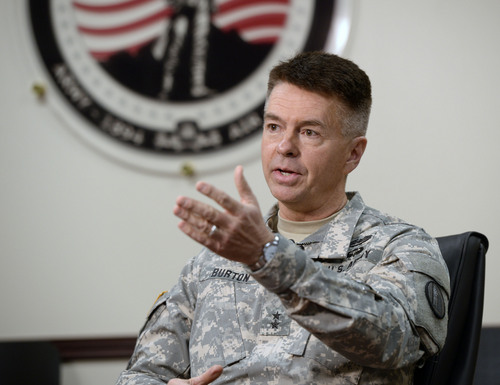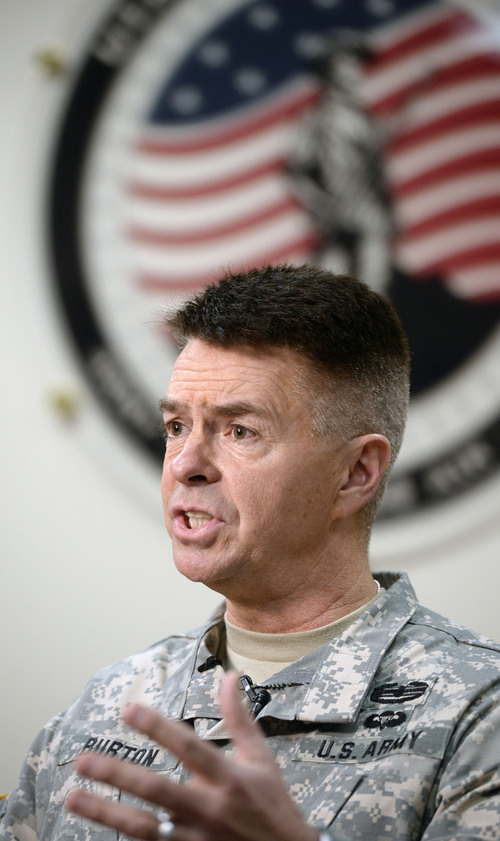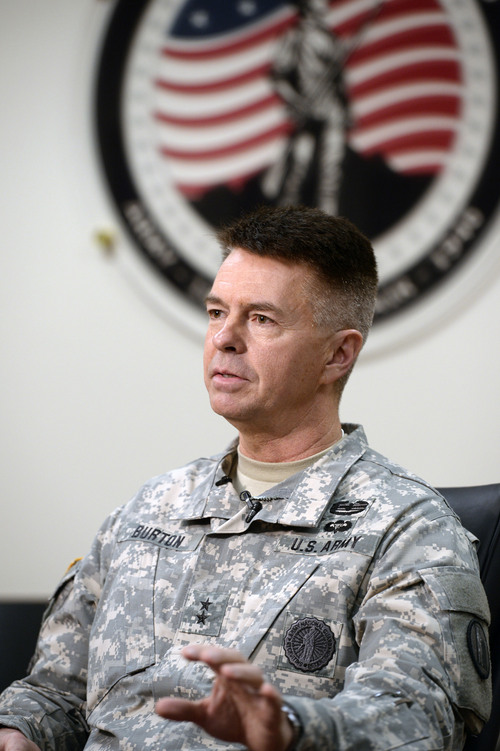This is an archived article that was published on sltrib.com in 2014, and information in the article may be outdated. It is provided only for personal research purposes and may not be reprinted.
Draper • Utah National Guard Maj. Gen. Jefferson Burton questions the U.S. Army's plan to take back all of their AH-64 Apache helicopters, 16 of which are here.
Burton explained in a press conference Monday that 212 National Guard employees work on those Apaches — jobs that are in danger if the helicopters leave. He confirmed that the Army's restructuring plans for the next fiscal budget include removing all Apaches from the Guard and using them for scouting missions on the battlefield. The Utah Guard's Apaches are stationed at South Valley Regional Airport in West Jordan.
"We're concerned about it," Burton said. The Guard would try to find new positions for as many of the people tied to the Apaches as they can, but not all of them may find a new place after the move. The Army intended to use Comanche helicopters for reconnaissance, a plan that was scrapped a few years ago. Burton figures that the Army wants to save money by using the Apaches in that role instead of buying new aircraft.
Since the move is part of the defense budget, it requires Congressional approval. The Army intends to begin briefing members of Congress this week. Utah Rep. Rob Bishop sits on the House Armed Services Committee, which would review the proposal. Such a committee meeting has not been scheduled yet, according to Bishop's staff.
In the meantime, Burton called for a pause in the process so that a commission can study the proposal. "We don't need to rush this."
Homeland defense is better served with resources spread out, an idea of an armed militia that the country was founded on, Burton argued. In the meantime, the Utah Guard occasionally has dispatched the helicopters on search and rescue missions and to find hot spots in wildfires, taking advantage of the infrared sensors.
The principle aside, the shift costs money, Burton added. The Army might have to spend about $500 million to $750 million to train new pilots to fly all 192 of the existing Apaches, the general said.
Beyond that, because of the full-time nature of the Army and part-time nature of the Guard, it would cost the Army about $76.8 million a year to run one Apache unit, as opposed to the $31.8 million a year it costs the Guard for the same, said Chief Warrant Officer Ken Jones, a pilot instructor for the Utah Guard. Jones also pointed out that in the past five years, active-duty pilots have caused 10 crashes that destroyed the helicopter, as opposed to the National Guard's clean record for the same timeframe. Apaches cost about $30 million each.
The Guard attracts older, more experienced pilots, as opposed to the 20-somethings in the Army, Burton said.
Even besides the jobs and the money, some would argue that the Apaches are not great scouts. Burton would rather see the Army use drones for reconnaissance missions.
"The Apache's pretty loud, it's hard to mask in one of them," added Alexander Horony, a board member for the Combat Helicopter Pilots Association. "It's not designed in any way, shape or form to be a scout."
Jay Brown, executive director of the association, served with Horony in the Persian Gulf. Apaches are big, strong, capable aircraft, he said, but they use sensors to shoot targets from long distances. If they are close enough to the ground to see tracks, that's a "multi-million dollar aircraft close enough for someone to shoot it down," Brown said.
The move makes no sense to Brown, nor to other pilots he has talked to since news of the plan first appeared online about a month ago.
A petition to halt the removal popped up Sunday on WhiteHouse.gov. As of 4:30 p.m. Monday, 313 people had signed the petition, which needs about 99,600 more by Feb. 11 before the president has to respond to it. About 40 percent of the people who signed self-identified as Utahns.
The Guard has the same aviation flight requirements, costs two-thirds less and does just as well as their active-duty counterparts, the petition claims. The Army would increase its vulnerability by "axing [a third] of the most experienced aviators and mechanics. It would take [20-plus] years to train an equally experienced replacement force," the petition adds.
Gov. Gary Herbert was traveling to Washington, D.C., Monday afternoon and could not be reached for comment.
Twitter: @Mikeypanda









